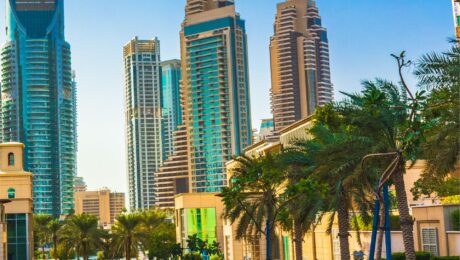Romania Has A Law On Offshore Wind Energy
The new law on offshore wind energy that Romania’s President Klaus Iohannis has promulgated marks a significant advancement for renewable energy initiatives in Romania. This legislation paves the way for the development of offshore wind farms, aiming to boost the country’s energy independence and environmental sustainability.
The law establishes a clear framework for implementing electricity generation projects using offshore wind resources. This includes the establishment of offshore perimeters that can be offered for concession, which are areas designated for the exploration, construction, and operation of wind power plants. The Ministry of Energy plays a pivotal role in conducting expert studies to identify these perimeters and ensuring that the selection process is based on non-discriminatory principles, fair competition, and environmental sustainability.
Key responsibilities of Romania’s Ministry of Energy under this new law include:
- Conducting expert studies to determine viable areas for offshore wind energy projects.
- Establishing the technical specifications and environmental considerations for these areas.
- Managing the competitive tendering process for potential concessionaires.
- Drafting and managing concession contracts, including stipulating the rights and obligations of all parties involved.
- Overseeing compliance with these contracts and ensuring that concessionaires adhere to the specified environmental and technical standards.
The law also emphasizes the importance of using the best available techniques to prevent and control pollution, reflecting Romania’s commitment to sustainable development. This move not only fosters the growth of green energy but also opens up a myriad of business opportunities for both local and foreign investors interested in the renewable energy sector.
Moreover, within three months of its entry into force, the Ministry of Energy is tasked with initiating the procedures to prepare an expert study for the concession process. This demonstrates the government’s urgency and commitment to implementing this law effectively and expeditiously.
This legislation could significantly transform Romania’s energy landscape, making it an attractive destination for renewable energy investments and collaborations, enhancing the country’s energy security, and contributing positively to global environmental goals.
- Published in News
Best Practices To Approach When Investing In Romania
Direct foreign investment in Romania has decreased recently, as noticed by the National Institute of Statistics. The top foreign investors in Romania have become Romanian immigrants who send money to their relatives in the country.
In this context, one of the most experienced foreign lawyers specializing in investing in Romania, Mr. Nicholas Hammond, shared his thoughts on best practices to approach and mistakes to avoid when investing in Romania as a foreigner. His firm, Hammond Partnership, was the first foreign law company to open an office in Bucharest, and this was quite an adventure, as he remembers.
As a Romanian law firm with a wide range of clients from major industry leaders to small startups, we see our role as Romanian lawyers in Bucharest as to guide, lead, and sometimes contradict our clients and point out potential issues to be resolved. As a solicitor fresh out of London, I came to Romania to open a Romanian law firm, and it was a new experience. Opening the first foreign law office in Romana after 1989 was an adventure. To still be here some 30 years later is a success for my firm, and I am proud of it. There have been some missteps on the way, but as we emphasize to all our Romanian and international clients, Romania is still a wonderful place to do business. Nicholas Hammond, Senior Partner at Hammond Partnership
According to Nicholas Hammons, it is essential to understand the local laws and society and how Romanian business works before going into business. Romanian company law differs from company law in England and the United States. The ways of doing business are vastly different.
The legal liability of Romanian company directors (administrators) differs from that of an English company director. The responsibilities of a director are different, as are their powers. The structure and authority in business are different, as is the thinking behind the law. It would be best if you had a clear explanation of the liabilities of an administrator before taking on this responsibility. This is not to advise you not to become a director of a Romanian company but to emphasize that you need to understand what it entails. A Romanian company’s taxation rules appear straightforward, but again, take advice.
Nicholas Hammond also approached one sensitive topic: why Romanian lawyers are not so successful in certain situations when foreign investors need advice on opening a business in the country.
There are many Romanian lawyers who, unfortunately, do not understand the thinking of a foreign investor and, therefore, misadvise them. Too often, assumptions are made regarding their client. It is natural for investors to assume that if someone speaks English, the Romanian lawyer or the Romanian law firm delivers advice in the same manner and with the same understanding as they would receive in England. Just like any other relationship, the relationship between a lawyer and his client is based on trust and clear communication. Still, often, there is a vast difference between what is said and what is understood. Words used by a natural English speaker often do not mean the same for a Romanian speaker. Context can produce disastrous miscommunication. For example, “I want“ in Romanian is a translation of “I would like.” This can have an entirely different impact in English and on a native English speaker.Nicholas Hammond on why is better to choose an adequate law firm when investing in Romania
He advises that when you come to Romania to invest, write as many questions on paper as you can, ask your Romanian lawyer the questions, and seek to understand the answers. The price for fully answering their questions could save you higher fees. Do not choose your lawyer on price but on an evaluation of the advice that they give now and can give in the future.
- Published in News
International Bar Association Conference in Bucharest, Romania – May 22-23
The International Bar Association (IBA) Bar Issues Commission gears up for the highly anticipated 17th Annual Bar Leaders’ Conference, set to take place on May 22-23, 2024, at the JW Marriott Bucharest Grand Hotel in Bucharest, Romania. This premier event serves as a global platform for bar leaders to convene, address critical issues impacting the legal profession, and chart a course for the future, Valahia News reports.
The event takes place in one of Bucharest’s most exquisite hotels, so the venue’s success is influenced by both the city and its location.
17th Annual Bar Leaders’ Conference Topics: Tackling Pressing Concerns and Advancing the Legal Profession
The conference agenda promises insightful discussions on various topics central to the legal landscape. A key theme will be the role of bar associations during a year marked by numerous national elections worldwide. Experts will explore how these organizations can effectively navigate the political landscape and advocate for important issues while maintaining neutrality.
Another topic sure to spark conversation is the rise of generative AI and its potential impact on the legal field. The conference will explore the disruptions and opportunities this technology presents, equipping bar leaders with strategies to prepare for a rapidly evolving legal landscape.
Furthermore, the program delves into the ever-changing dynamics of bar association governance. Leaders will gain valuable insights into emerging trends and acquire best practices to ensure their organizations’ effective and adaptable management.
The conference will not shy away from addressing the pressing issue of climate change. Leaders will explore bar associations’ crucial role in promoting sustainable practices and advocating for environmental action.
International Bar Association IBA: A Unique Platform for Collaboration and Shared Knowledge
The International Bar Association (IBA) is a unique platform that fosters collaboration and shared knowledge across the global legal community. This international association brings legal professionals worldwide, creating a space for exchanging ideas, best practices, and expertise.

Our profession, through a global association such as the IBA, has a great opportunity as well as the responsibility of assuming a leading role in upholding the rule of law, democracy, and human rights across the world and thus having a positive impact on society.
Almudena Arpón de Mendívil Aldama, President IBA
The Romanian lawyers also see the IBA as a platform for collaboration at the international level between lawyers worldwide, as Alexandru Paun, a senior member of the Bucharest Bar Association Council, acknowledges:

Bar leaders face a complex and demanding role. The Bar Leaders’ Conference provides a unique platform for leaders to share experiences, insights, and best practices with their global counterparts. This collaborative exchange of knowledge is essential for navigating the challenges and opportunities that lie ahead for the legal profession.
Alexandru Paun, senior member of the Bucharest Bar Association Council
The 17th Annual Bar Leaders’ Conference promises to be a cornerstone for shaping the legal profession’s future. Registration details are available on the IBA website, encouraging bar leaders to seize this exceptional opportunity for connection, learning, and collective action.
- Published in News
Romanian Law Firm Leaua Damcali Deaconu Paunescu – LDDP, Swiss Firm LALIVE SA Wins Case against Gabriel Resources for Romania
Romania won the case against Rosia Montana Gold Corporation, in which Gabriel Resources LTD (GBU.TO) demanded approximately USD 6.7 billion in compensation, according to the decision of the International Court of Arbitration of the International Center for the Settlement of Disputes Related to Investments.
Gabriel Resources invested EUR 900 million and demanded compensation of EUR 6.7 billion because the project failed. The international arbitration action was initiated in 2015 against Romania by two foreign investors, Gabriel Resources Ltd. and Gabriel Resources (Jersey). It was based on the Agreements regarding the promotion and mutual guarantee of investments concluded by Romania with the Government of Canada (ratified by Law no. 356/2009) and the Government of the United Kingdom of Great Britain and Northern Ireland (ratified by Law no. 109/1995).
The decision was initially announced on Friday evening by Prime Minister Ciolacu, after weeks in which signals were sent from the Government that Romania could lose the trial and be forced to pay huge penalties.
Romania was represented in this process by the Romanian law firm Leaua Damcali Deaconu Paunescu – LDDP and the Swiss firm LALIVE SA.

According to the document through which the decision was communicated, the decision was taken by the majority, and it also establishes a series of damages compensations that the Gabriel Resources company will have to pay to Romania, sums of money related to court costs. It is about EUR 1.1 million, RON 30.3 million and USD 0.928 million.
- Published in News
Romanian PR Agency Lighthouse Represents Eurocom in Romania and Republic of Moldova
Eurocom Worldwide, the global PR network, is strengthening its representation in Central and Eastern Europe by appointing Lighthouse PR, headquartered in Bucharest and covering both the Romanian market and the Republic of Moldova.
Founded by Ana Maria and Steve Gardiner, Lighthouse PR is a strategic PR and communications agency that brings a wealth of global expertise with a team of senior communications specialists offering a background of C-level management roles in large corporations. Lighthouse PR focuses on B2B and corporate communications with a strong focus on international tech companies and sectors such as energy, finance, pharma, retail & FMCG, industrial production, real estate, and construction.
Moreover, Lighthouse PR is Romania’s exclusive member of the Crisis Communication Network Europe (CCNE), a group of specialist crisis consulting agencies dedicated to European markets. The agency obtained the ISO 27001 certification for information security after securing the ISO 9001 certification for its quality management system in 2023.
The Lighthouse PR strategy has been designed to develop strong, long-term partnerships with our clients, whom we support 24/7/365 with the best communication consultancy Romania offers and other partners with whom we share a vision based on trust, expertise and collaboration. Joining Eurocom Worldwide is essential in strengthening our position as a trusted partner for companies looking for PR consultants who deliver above and beyond expectations.
Ana Maria Gardiner, co-founder of Lighthouse PR
Eurocom Worldwide is one of the most significant independent PR and marketing communications networks focusing on key technology, industrial and commercial sectors. Founded in 2002, it comprises 31 member agencies in 54 offices covering more than 90 countries across all five continents. Eurocom Worldwide has a strong presence in Central & Eastern Europe, covering over 20 countries.
- Published in News
Advocacy in Romania
Advocacy in Romania aims to improve the legislation and the public policies to defend people’s interests but also to monitor compliance with legal obligations towards individuals and groups so that they can preserve the integrity of their rights.
What does Advocacy mean?
Advocacy is the name given to a political process carried out by an individual or by a group of individuals whose aim is to influence decisions to adopt public policies and allocate resources within political, economic and social systems and institutions.
Advocacy services can have moral, ethical or religious motives, or they can be motivated by the protection of goods of public interest. Advocacy activities include, among others, media campaigns, advertising campaigns, public speeches and debates, and research and surveys on specific topics. The activity of advocacy groups is not limited to influencing decisions and policies in the country of origin but can be extended at a transnational and international level.
Advocacy versus Lobby – Understanding the Difference
If we compare advocacy and lobbying, while the term advocacy refers to the influence of decisions at the broader public level, lobbying can be considered a particular form of advocacy that relies more on private interests. Barry Hessenius considers that advocacy focuses more on promotion materials, education, and awareness and less on persuading decision-makers directly. The regulations do not favour lobbying activities as they are considered to lead to acts of corruption. However, some people lobby professionally and come to the aid of the people or organizations that employ them.
An example of advocacy in Romania
We include here an example of a successful advocacy campaign in Romania that we find dear to us. Charley Ottley, the renowned wildlife documentary producer known for his love for Romania’s natural beauty, has launched an advocacy campaign in Romania to promote bear rights. Collaborating with Agent Green, an environmental NGO, Ottley calls for the informal adoption of bear rights, recognizing bears as sentient beings with inherent value. Their initiative involves reaching out to companies that use bears as part of their branding, urging them to contribute to bear conservation efforts.
This innovative approach aims to empower bears and highlight their importance in maintaining Romania’s rich biodiversity.
Successful advocacy organizations in Romania and campaign examples
Romania has a vibrant community of organizations, many of which advocate for social justice, human rights, and environmental protection. Three examples of the most successful advocacy organizations in Romania are Lobby Romania, FARA Charity Foundation and World Vision Romania.
If we’re about to give some examples of successful advocacy organizations in Romania, we would first think about Lobby Romania, one of the most visible and engaged organizations, which has the purpose of providing information about professional lobbying, viewed as a multidisciplinary activity. Lobby Romania was founded for information about lobbying activity, viewed as a multidisciplinary lobbying field, which requires juridical, economic, sociological and communication knowledge. In Romania, a law regulating lobbying was drafted but has never been voted on and promulgated.
Another example would be FARA Charity Foundation, a leading voice for children’s rights in Romania, advocating for policies and programs that protect children from discrimination, abuse, and neglect. The foundation’s advocacy campaigns have helped to improve access to education, healthcare, and social protection for children in Romania.
Last, we would mention World Vision Romania, a humanitarian organization that works to improve the lives of children and families in need. The organization’s advocacy work focuses on policies that address child poverty, malnutrition, and access to education. World Vision Romania has been instrumental in advocating for the passage of legislation that protects children’s rights and promotes their well-being.
- Published in News
Romanian Entrepreneurs Started Setting Up Companies in Dubai
In recent years, the entrepreneurial landscape in Romania has undergone significant transformations, with rising taxation and regulatory complexities posing challenges for aspiring business owners. As a result, many Romanian entrepreneurs seek alternative destinations to nurture their growth ambitions. Among these, Dubai has emerged as a beacon of hope, offering a compelling blend of business-friendly policies, a thriving commercial ecosystem, and a global network of opportunities.
So, while the Government considered taxation a way to get more money for the national budget, the Romanian entrepreneurs considered setting up their businesses elsewhere, especially in countries with low taxation. Dubai is one of their choices, but there are others alike.
Why Dubai Beckons Romanian Entrepreneurs
The decision of Romanian entrepreneurs to establish their business in Dubai is driven by a multitude of factors, including:
- Tax Advantages: Dubai’s tax structure is renowned for its simplicity and attractiveness. Companies in Dubai enjoy a zero corporate tax rate and are exempt from personal income tax for non-resident shareholders. This tax-neutral environment provides a significant financial advantage for Romanian entrepreneurs, allowing them to retain more of their profits and reinvest them in their businesses.
- Regulatory Simplicity: Dubai’s regulatory framework is known for its ease of compliance and transparency. The government has streamlined the business registration process, making it more straightforward for entrepreneurs to establish their companies and obtain the necessary licenses. This streamlined approach reduces administrative burdens and allows businesses to focus on their core operations.
- Diverse Business Ecosystem: Dubai boasts a diverse and dynamic business ecosystem, encompassing a wide range of industries, sectors, and multinational corporations. This vibrant environment provides Romanian entrepreneurs access to a vast network of partners, suppliers, and potential customers, fostering business growth and opportunities for collaboration.
- Gateway to Global Markets: Dubai is a strategic gateway to the Middle East, Africa, and South Asia, providing Romanian entrepreneurs access to a vast and untapped market of over 3 billion consumers. This strategic location allows businesses to expand their reach and tap into new revenue streams.
The migration of Romanian entrepreneurs to Dubai signifies a paradigm shift in entrepreneurial thinking. It reflects a strategic approach beyond mere tax considerations and instead embraces a holistic assessment of the business environment, regulatory landscape, and global connectivity. With its unique blend of these factors, Dubai emerges as an attractive destination for Romanian entrepreneurs seeking to propel their ventures to new heights.
Emerging Opportunities and Challenges
As Romanian entrepreneurs venture into the Dubai business landscape, they encounter opportunities and challenges. While the tax advantages and business-friendly environment provide a strong foundation, understanding cultural nuances, adapting to local business practices, and establishing a solid network of connections are crucial for success.
Supportive initiatives, such as government programs, business matchmaking events, and networking opportunities, are emerging to assist Romanian entrepreneurs in navigating the Dubai business scene. These initiatives provide valuable guidance and resources, helping entrepreneurs overcome challenges and maximize their potential.
The decision of Romanian entrepreneurs to set up companies in Dubai marks a significant milestone in the evolution of their entrepreneurial journeys. Dubai’s business-friendly environment, diverse ecosystem, and global connectivity provide a fertile ground for growth and innovation. As Romanian entrepreneurs embrace this new chapter, they are poised to contribute to Dubai’s economic success and establish a strong footprint in the global marketplace.
- Published in News
Eyes on Romania: Investors Grew the M&A Market above USD 7 Billion
Romania remains on investors’ radars despite the rising cost of money and inflation. In value, the M&A market exceeded 7 billion dollars in 2023 but was massively supported by two mega transactions. This year is still under the sign of growth, Romania News reports.
The takeover of Profi by Ahold Delhaize, the owner of Mega Image, for $1.4 billion and the sale of Enel Romania to the Greeks from PPC for $1.3 billion are the essential local transactions and the two mega transactions (worth over 1 billion dollars) from last year. Also, in 2023, there were three other agreements of 200-300 million dollars each, with medium-sized transactions vital for the health of the M&A market.
The steps in a merger and acquisition are complex, but with the help of specialized lawyers, investors overcome any legal challenges.
In 2023, 241 transactions were initiated in Romania, with a total value estimated at almost 7.1 billion dollars, according to an analysis by the audit and consulting company EY. It is about the total value of the market, i.e. both transactions with communicated and uncommunicated value, but estimated by EY, are taken into account.
In terms of volume, the market decreased slightly compared to the maximum reached in 2022 – when 257 agreements were signed, 16 more than last year – but in terms of value, it is the best year (plus 6%).
The data show that Romania remains on the radar of investors in the M&A market despite the rising cost of money and still high inflation, factors that have led to a cautious approach, especially among buyers. However, in value, the market exceeded 7 billion dollars because two mega transactions supported it.
The takeover of Profi by Ahold Delhaize, the owner of Mega Image, for $1.4 billion and the sale of Enel Romania to the Greeks from PPC for $1.3 billion are the most critical local transactions and the two mega transactions (worth over 1 billion dollars) from last year.
The corporate and M&A market is also expected to grow in Romania this year. The country is attractive to investors, and the economic outlook for 2024 is somewhat optimistic, favouring the decision to invest.
- Published in News
Political marketing stunt: Official Complaint for the Missing of Romania’s President
Romania’s President is missing – this is what an Opposition deputy in Romania complained about when he went to the police station to file a missing person case. This could be the best political marketing stunt in years, and the Opposition Party AUR did it. The party is seen as a nationalist, far-right and extremist, isolated in Romania’s political scene for this labelling. However, their actions make all the political marketing experts take notes.
Romania’s President has been missing since December 18, the last day he was publicly seen. Thirty days later, AUR deputy Adrian Axinia went to a police station in Bucharest and filed a formal complaint for the missing person. The case was related to prime-time news by all major TV stations in Romania and all the major news platforms.
Also, the other major Opposition party, the so-called Reformists, USR, posted on Facebook a visual asking for any information about the missing President Johannis.
These complaints are pure political marketing, not else. Romania has four elections in 2024, and the campaigns have just started. However, Johannis is a fake target, as he is in his second presidential term. The real target is the Liberal Political Party – PNL, the now ruling party, and the Socialists. PNL is the party initially supporting Johannis for the presidential elections and his ten-year presidential mandate.
The Opposition exploits citizens’ complaints about their president, among which his notorious missing from office to take long and exotic vacations is only one of them.
- Published in News
Romanian Government Succeeds in Making Dual Citizenship Possible for Romanians in Spain
Due to the Romanian Government’s lobby, Romanians living in Spain will soon have dual citizenship. The Spanish Prime Minister, Pedro Sanchez, will arrive in Romania at the end of January to sign the agreement between the two governments. The two parties have already agreed on the document’s final version.
This success started in 2022 when a joint meeting of the Spanish and Romanian Governments was organized in Spain. At that moment, the Romanian part asked for the Romanians living in Spain to be allowed to have dual citizenship. After that meeting, dual commissions have been established to work on the agenda to fulfil what is now possible.
According to the existing law, the Romanians in Spain who want to get Spanish citizenship must give up their Romanian citizenship. After the two governments sign the agreement, they will get a second citizenship without giving up the Romanian one. Also, they will get jobs, such as in the Spanish Army, administration or police.
So far, this privilege of dual citizenship has been offered only to French and Portuguese nationals, and Romania has become the third country Spain offers this.
More than 1 million Romanians live in Spain, while around 600,000 have residency. Romanians form one of the largest communities of foreigners in Spain.
- Published in News












